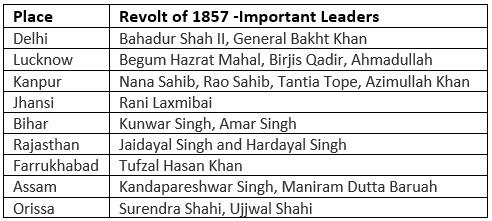First War of Independence against British: The Revolt of 1857 | History for UPSC CSE PDF Download
INTRODUCTION
- The revolt of 1857 was the conscious beginning of the Independence struggle against the colonial tyranny of the British. There are various names for the revolt of 1857 – India’s First War of Independence, Sepoy Mutiny, etc.
- The revolt began on May 10, 1857, at Meerut as a sepoy mutiny. It was initiated by sepoys in the Bengal Presidency against the British officers.
- This war of Independence marked the end of rule by the British East India company. Post this, India was directly ruled by the British government through representatives known as Governor-General.
IMMEDIATE REASON OF REVOLT OF 1857
The immediate factor was the introduction of the ‘Enfield’ rifle. The cartridge had to be bitten off before loading it into the gun. Indian sepoys believed that the cartridge was greased with either pig fat or made from cow fat. This was against the Hindu and Muslim sentiments and religious ideologies. Thus they were reluctant to use the ‘Enfield’ rifle. This was a flashpoint to enrage the soldiers against the Britishers. This was believed to be the immediate factor for the revolt of 1857.
CAUSES OF REVOLT OF 1857
The revolt of 1857 was initiated due to various factors which are stated below:
- Religious & Social Causes – racism or racial discrimination was believed to be a major reason for the revolt of 1857 wherein Indians were exploited and were kept away from mixing with Europeans. The whites also started interfering in the religious and cultural affairs of Indians and tortured them as well.
- Political Causes – The British expansion had led to the propagation of unjust policies that led to the loss of power of the Nawabs and Zamindars residing at various places of India. The introduction of unfair policies like the policy of Trade and Commerce, the policy of indirect subordination (subsidiary alliance), the policy of war and annexation, the policy of direct subordination (doctrine of lapse), the policy of misgovernance (through which Awadh was annexed) greatly hampered the interests of the rulers of the native states, and they one by one became victims of British expansionism. Therefore, those rulers, who lost their states to the British, were naturally against the British and took sides against them during the revolt.
- Economic Factors – There were various reforms in the taxation and revenue system that affected the peasants’ heavily. British Government had imposed and introduced various administrative policies to expand their territory.
The major policies are listed below:
- Permanent Settlement in Bengal
- Mahalwari settlement in Central India & Ryotwari settlement in southern India
These three settlements were highly exploitative, and in particular, the Permanent settlement had created a devastating impact. Thus the peasants were greatly encouraged to overthrow the British Government from India and led to their active participation in the revolt of 1857.
- Military Factors – The Indian soldiers faced a lot of discrimination from the British officials with respect to their salaries, pensions, promotions. Indians were subjugated in the military while their European counterparts faced no such discrimination. This led to discontent and was a major military factor that resulted in the revolt of 1857.
Vellore Mutiny
The Vellore Mutiny took place even before the revolt of 1857 (50 years before). It erupted on 10th July 1806 in Vellore, present-day Tamil Nadu, and lasted only for a day, but it was brutal and it was the first major mutiny by the Indian sepoys in the East India Company.
IMPACT OF REVOLT OF 1857
The revolt of 1857 shook the foundation of British East India Company and disclosed their inefficiency in handling the Indian administration. The major impact was the introduction of Government of India act which abolished the rule of British East India Company and marked the beginning of British raj that bestowed powers in the hands of the British government to rule India directly through representatives.
CAUSES OF FAILURE OF THE REVOLT OF 1857
The revolt was eventually not successful in ousting the British from the country because of several factors.
- The sepoys lacked one clear leader; there were several. They also did not have a coherent plan by which the foreigners would be routed.
- Indian rulers who aided the revolt did not envision any plan for the country after the British were defeated.
- Majorly northern India was affected by this revolt. The three presidencies of Bengal, Bombay and Madras remained mostly unaffected. The Sikh soldiers also did not take part in the rebellion.
LIST OF IMPORTANT LEADERS ASSOCIATED WITH THE REVOLT OF 1857
|
216 videos|855 docs|219 tests
|
FAQs on First War of Independence against British: The Revolt of 1857 - History for UPSC CSE
| 1. What was the cause of the Revolt of 1857? |  |
| 2. Who were the key leaders of the Revolt of 1857? |  |
| 3. What were the major battles fought during the Revolt of 1857? |  |
| 4. Did the Revolt of 1857 achieve independence for India? |  |
| 5. How did the Revolt of 1857 impact the British rule in India? |  |

















